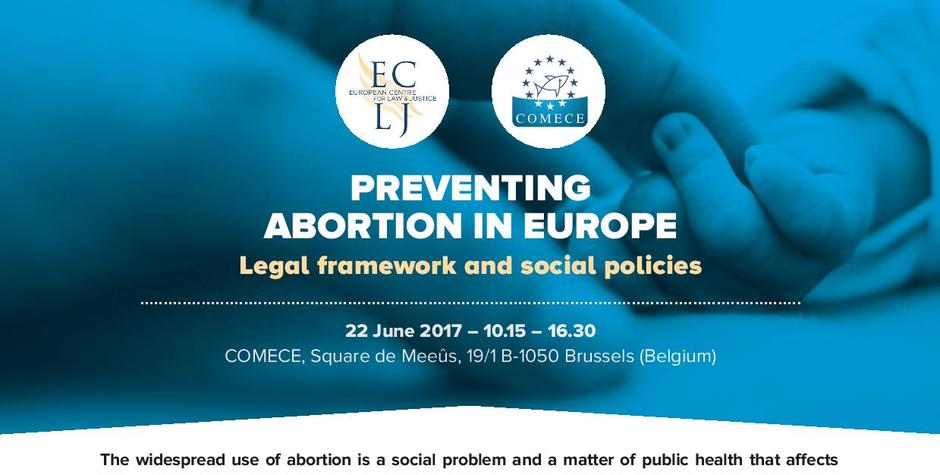

European Seminar: Preventing Abortion in Europe, Legal Framework & Social Policies
Seminar: Preventing Abortion in Europe
Preventing Abortion in Europe
Legal framework and social policies
COMECE, Brussels (Belgium) - 22 June 2017
Synthesis presented: Preventing Abortion in Europe
Program
Find out the videos and texts of all the interventions made that day (we will progressively upload them all).
10:15 Opening of the Seminar, Fr. Olivier Poquillon, Secretary general of COMECE
10:30 First session: Legal Framework
Chair: David Fieldsend, Chairman of Sallux board
- The State’s Duty to Prevent Abortion, Grégor Puppinck, PhD.
- Abortion and Human Rights, Javier Borrego, Former judge at the ECHR
- Abortion and Eugenics, Jean-Marie Le Méné, Fondation Jérôme Lejeune
- Abortion and Conscientious Objection, Claire de La Hougue, PhD.
- The Right for Institutions not to Perform Abortion, Prof. Jean-Pierre Schouppe, PhD.
- Abortion and Freedom of Expression, Christophe Foltzenlogel, ECLJ
- Q&A
12:45 Lunch break
14:00 Second session: Social Policies and good Practices
Chair: Grégor Puppinck, ECLJ Director
- Risk Factors and Consequences of Abortion, Cherline Louissaint, Esq.
- France, Caroline Roux, Alliance Vita
- Germany, Petra Cador, PhD.
- Italy, Prof. Assuntina Morresi, PhD.
- Macedonia, Vladimir G., Representative
- Poland, Karina Walinowicz, Esq. & Olaf Szczypinski
- Slovakia, Patrik Daniska, Esq.
- Q&A
17:00 Conclusion of the Seminar, Grégor Puppinck, ECLJ Director
* * *
The widespread use of abortion is a social problem and a matter of public health that affects the whole society and engages our future. The purpose of this seminar is to identify good practices for effective abortion prevention policies, particularly among young people.
Abortion is a public health problem
Every year in Europe, about 4 million women end their pregnancies; more than 30 million abortions were performed since 2010, representing a quarter of all births (Guttmacher Institute, Datta Center).
Abortion has considerable and undeniable cultural, demographic, economic and social consequences. 42% of women who had an abortion before the age of 25 go through a depression. Half of the women who had an abortion when they were minor suffer from suicidal thoughts. Women having had an abortion are three times more likely to suffer physical, mental or sexual abuse than women who went through their pregnancies.
It is possible to reduce the recourse to abortion
Abortion is not inevitable; many countries have managed to reduce the abortion rate thanks to prevention policies.
In Italy, for example, the number of abortions fell by 56% between 1982 and 2013, reaching 102,000 i.e. half the number of abortions in France for a country slightly smaller. Yet in Italy, abortion and contraceptive rates are among the lowest in Europe. In Germany, the official number of abortions declined from 135,000 to 99,000 between 2001 and 2015, in Latvia from 13,000 to less than 5,300 between 2004 and 2013, etc.
In the US, the teenage pregnancy rate was reduced by half between 1990 and 2010 thanks to a campaign centred on abstinence to value sexuality and human life, and to make teenagers aware of their responsibilities. The number of high school seniors declaring to be abstainers has doubled from 33% to 66%, causing a reduction of two thirds of abortions among young people, a decline of STDs and an improvement in their emotional and psychological balance.
Many concrete preventative measures need to be implemented, aiming in particular at better educating young people, to help women and empower fathers.
Reducing the recourse to abortion should be a priority
Reducing the recourse to abortion is also an obligation contracted in international law. Most of European States have committed themselves to support family, motherhood and children "before as well as after birth" (Convention on the Rights of the Child), to "reduce the recourse to abortion" and to "take appropriate steps to help women avoid abortion" (Cairo Conference). The Council of Europe also called on European states to "promote a more pro-family attitude in public information campaigns and provide counselling and practical support to help women where the reason for wanting an abortion is family or financial pressure." (PACE, 2008).



This event was co-sponsored by Sallux*, the Fondation Jérôme Lejeune & Alliance Vita.
*Since 2011, the activities of Sallux have been financially supported by the European Parliament. The liability for any communication or publication by Sallux, in any form and any medium, rests with Sallux. The European Parliament is not responsible for any use that may be made of the information contained therein.












